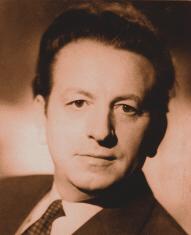Krebs studied conducting in Dortmund and Berlin, but when doubling as a répétiteur for one of the
professors at the Berlin academy of music, he was found to have a promising voice himself.
He made his debut in 1937 as Monostatos at the Berlin Volksoper, where he stayed until 1944, though interrupted by military
service during WWII. After the war, he sang in Düsseldorf for two years. In 1947, he was hired by the Städtische
Oper Berlin (renamed Deutsche Oper in 1961), where he stayed for good; his last appearance at that house was in 1988.
In opera, he sang both large and comprimario parts: Ferrando, Belmonte, Idamante, Tamino, Châteauneuf, the Italian
Singer, David (which was his most successful part), Spalanzani, Pelléas, Almaviva, Ernesto; plus a whole lot of
contemporary opera:
Albert Herring, the title role in Stravinsky's Oedipus rex, Albert in Leonore 40-45 by Rolf Liebermann, Tiresias in Oedipus der
Tyrann by Orff, Aron in Schönberg's Moses und Aron (another great success). He sang in the world premieres of König
Hirsch (1956) and Der junge Lord (1965) by Henze, and of Rosamunde Floris by Boris Blacher (1960). He was in high esteem with
Ferenc Fricsay, who was chief conductor of the Städtische Oper Berlin from 1948 to 1952.
As a guest, Krebs sang at the Vienna Staatsoper, the Salzburg, Edinburgh and Glyndebourne festivals, La Scala, in Munich and
Hamburg.
An important part of his career took place on the concert podium, especially in oratorio (Bach's Passions, Verdi's
and Mozart's Requiem).
From 1957, he taught voice in Berlin, and from 1966 in Frankfurt.
Reference 1: Kutsch & Riemens, reference 2, reference 3 and picture source
Many thanks to Anton Bieber for the picture scan from the Körke book.

